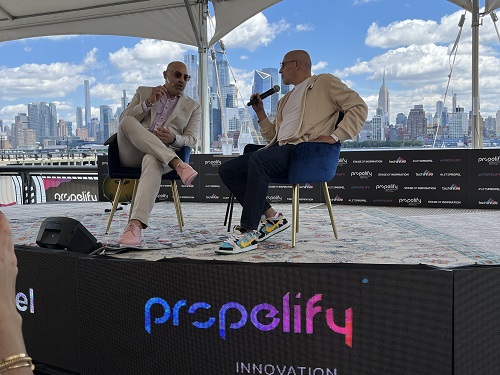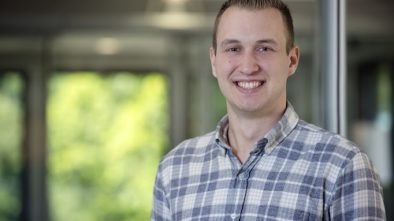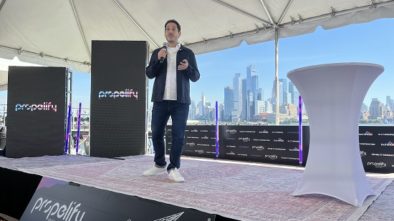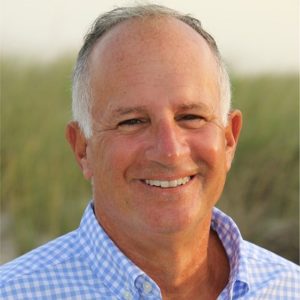Aaron Price Sits Down with Marc Lore at Propelify, and the Crowd is Wowed
By Rob Rinderman
Since its inception in 2016, the annual Propelify innovation festival on the Hoboken waterfront has featured more than 500 speakers, including Gary Vaynerchuk, Arianna Huffington, Bobbi Brown, Al Roker and New Jersey Governor Phil Murphy, to name a few.
This year, serial entrepreneur, investor and NBA franchise owner Marc Lore — who has already successfully sold three prominent companies and founded several others along the way — dropped by for a fascinating fireside chat with Propelify founder Aaron Price.
The fireside quickly transformed into a virtual fire hose of fast-paced back-and-forth conversation between the two. Lore admitted early on that he grew up with nothing in nearby Staten Island, but admitted that he was very fortunate to have been “raised by very kind and humble grandparents.”
In terms of his current entrepreneurial endeavors, Lore is not exactly resting on his laurels at this point in his illustrious career. His present full-time gig is as CEO of Wonder Group (New York), a modern-day, disruptive brick-and-mortar takeout and delivery food-court business that he founded in 2018.
Wonder locations include nearly 30 different restaurant food concepts, from well-known chefs like Bobby Flay to the pizza professionals at Brooklyn’s Di Fara, which has been lauded for its artisanal pies since opening its doors back in 1965. Harlem’s Marcus Samuelsson, the Ethiopian-Swedish chef/owner of Red Rooster, is also one of Wonder’s contributing partners. Chef Samuelsson, who, like Flay, is frequently seen on television in various food-related programs, owns and operates many restaurants with distinct cuisine concepts around the world.
Wonder currently lists a dozen physical locations on its website, including several in Manhattan and Brooklyn, plus a growing footprint across New Jersey, including Westfield, Cresskill, Midland Park, Springfield and Hoboken. There is also one in Quakertown, Pa.
As excited and passionate as Lore is about the present and future of Wonder, he is clearly also extremely proud to be in the rarefied air of a professional American sports franchise owner.
He signed an LOI (letter of intent) in 2021 with partner Alex “A-Rod” Rodriguez, the legendary retired baseball player, businessman, broadcaster and philanthropist. And their dream of owning stakes in both the Minnesota Timberwolves of the NBA and the WNBA franchise Minnesota Lynx became a reality later that year. When Price asked him to comment on the Timberwolves/Lynx purchase, Lore labeled it a “pure fun investment.”
Past Successes
Notable exits by Lore include the divestiture of Diapers.com (which he originally cofounded in 2005 in Montclair under the name “1800DIAPERS”) to Amazon for $545 million six years after its inception. Lore stayed on as a member of Amazon’s senior team for a couple of years following the sale.
Approximately three years after departing from Amazon, Lore struck again, this time orchestrating a massive $3.3 billion sale of his Hoboken-based e-commerce business Jet.com to Walmart in 2016. After that exit, he stayed on to head up Walmart’s domestic e-commerce division, serving as president and CEO.
A considerably less well-known success for Lore — which took place early in his career — was The Pit, which he cofounded in 1999 and served as CEO. The Pit was an internet market-making collectibles company that served as an alternative to market leader eBay. Sports collectible company Topps (New York) recognized the organization’s value and paid Lore and his partner $5.7 million for the organization in 2001. As with his other high-value exits, Lore stayed on with the acquiring company. In this case, he was appointed COO of Topps’s gaming subsidiary, WizKids.
Quotes and Highlights
The following are some concise, quotable sound bites and highlights from Marc Lore’s fireside with Price.
- “You never really look to sell a company when you start as its founder.”
- “You need to change with the times as a company and always be looking over your shoulder in business, even if you are an Amazon or a Walmart … Sears was tops in retail at one time.”
- On his present leadership role at Wonder: “We are hoping to fundamentally change how people eat and impact their health.” [Lore stated that he works an average of 100 hours per week at Wonder].
- Lore disclosed that, in the process of raising a very impressive $700 million for Wonder, “we met with and pitched 300-plus prospective investors.”
- “We have enough capital now for a possible IPO in 2027.”
- On the importance of both risk-taking and making a fast pivot if you’re wrong: “We got out of Wonder’s food-truck business extremely fast … virtually overnight. The data told us we needed to switch to a brick-and-mortar business strategy, and we did.”
- Lore disclosed that, in the process of raising a very impressive $700 million for Wonder, “we met with and pitched 300-plus prospective investors.”
- “My work life is very intense now … I’m working harder than I did at Jet.com or Diapers.com.”
- “I do still make it a point to sleep eight hours each night.”
- “As a founder, you must early on create a vision. You must also create an impeccable customer value proposition.”
- “Once you have your value proposition set, you need to work like hell to reverse engineer how your business is going to make money.”
- “Good founders must have a strong point of view. Things must make sense economically, too. You need to have conviction as a founder … the worst thing you can do is be wishy-washy. Make a definitive decision and stick with it. Like a relationship, it’s over when it’s over. … Don’t go back on your decisions.”
- “Startups must get the best out of their talent.”
- “Key issues for earlier stage companies include … establishing your mission and set of values, plus trust, transparency and fairness. Empowerment and loyalty in combination are magic. You need to inspire the team. Lastly, an important acronym to remember is VCP — which stands for vision, capital and people.”
- “When pitching to prospective investors … each round of funding is different, depending on where you are in your company’s life cycle and its capital needs. Your ‘story’ in your pitch is going to vary significantly based on what stage your organization is at.”
- “You should be flexible on valuation when meeting with sources of funding for your company. Dilution doesn’t matter if you raise a lot of money.”
- Looking back on his success at Diapers.com: “We built a relationship with parents initially, and then sold them other things later at higher margins.”
- “Philanthropy gets me excited!”
- “I love helping people without expectations of getting anything back in return.”
- “There is a power of leading with giving rather than taking.”
- Despite all he has accomplished in business thus far, Lore said, “As an entrepreneur I’m still not yet where I want to be.”




